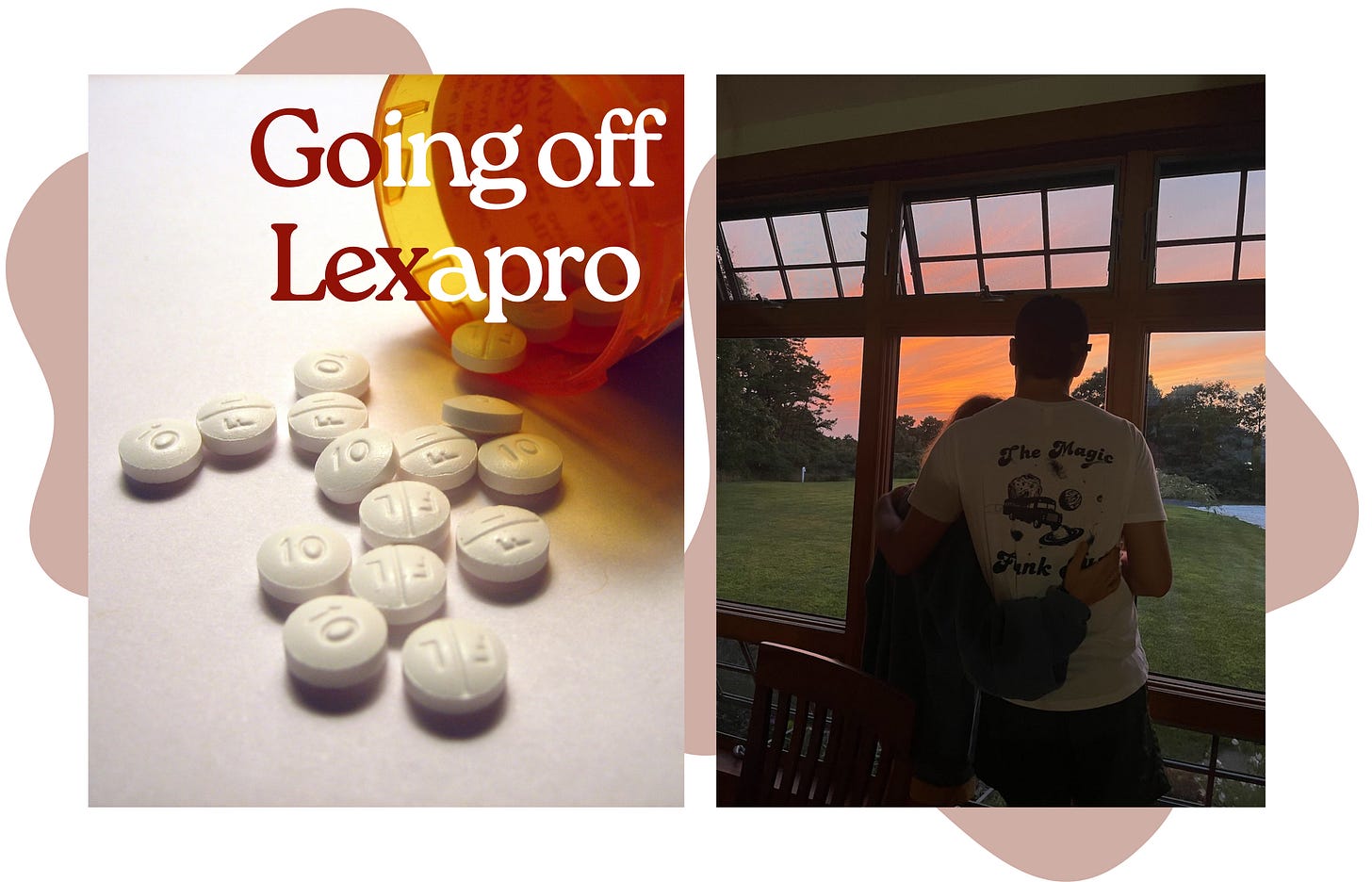Edited by
and Lilly Milman.Hey friends, Aliza and I are back after The Sams’ guest-star appearance. I don’t want to say it was a competition, but the four of us were all excited to see whose Monday link was the most popular… And Sam G won with his go-to book recommendation (a page-turner with a “sexy cover.”)
On a more serious note: Today’s essay talks about anxiety and depression. Because it’s a particularly personal one, the second half is paywalled. (If you’re not a paid subscriber, we have many free personal essays in our archives, including Makeup won’t make me feel beautiful; I lost my job, but my friends showed up; and What if the goal isn't “bouncing back”?)
I stopped taking Lexapro because I hated my psychiatrist.
I’d been seeing her since the beginning of COVID, after I’d started having panic attacks every time someone took more than 15 minutes to text me back. One time Sam went for an unexpectedly long walk without his phone and came back to find me in panicky tears; I was convinced he’d been hit by a car and died. My therapist promptly referred me to Dr. Hall.
After I told her about the anxiety attacks, Dr. Hall said she recommended Lexapro or Zoloft.
“Which would you prefer?” she asked.
I paused. Shouldn’t she be telling me that? Every other medical health professional I’d interacted with to date had been prescriptive — do this, don’t do that. I knew nothing about either medication, but one of my friends had started taking Lexapro. She’d seemed a lot calmer recently.
“I’ll take the Lexapro,” I said.
A day after that, I walked into CVS to pick up 30 days’ worth of pills.
They were a lot smaller than I’d imagined, the circumference of pencil erasers but flat. I took one diligently every night.
“Finally!” Dr. Hall said when we got on Google Meet as though I’d been late, not her. She asked how I was doing and if I’d noticed any side effects.
I’d called my dad a few days earlier. Getting his voicemail didn’t immediately trigger fears he’d been hospitalized for COVID.
“It’s working,” I said.
The psychiatric treatment I was less sure about. After our first two appointments, Dr. Hall and I talked on the phone every few months. Our conversation followed the same pattern every time and never lasted longer than five minutes: How are you doing? Fine. Are your parents okay? Yes. How often are you seeing your therapist? Once a week. What pharmacy do you use, again?
Her tone was brisk, businesslike. If I did deviate from our script — saying, for example, my reliance on exercise sometimes felt scary — she firmly shut me down: Talk to your therapist.
I pictured her looking at the notes she’d taken in April 2020. If she’d kept taking notes, I wasn’t sure what they’d say: “Doing fine”? After each appointment, I got a bill for $250.
Years passed this way. Short and straightforward as our calls were, they left me drained and resentful. Pretending we were having a legitimate, meaningful discussion of my mental health — that I wasn’t a $250 box to her — was exhausting. But the routine carried me along; we never ended a call without scheduling the next one, and it was easy enough to forget how bleak they made me feel until I saw the calendar reminder.
Last August, I missed the reminder. I didn’t remember we were supposed to talk until I saw her name pop up on my phone. Without any time to prepare myself, my self-preservation instincts took over — I stared at the screen, watching it pulse, letting it go to voicemail.
I received a bill for $100, the fee for no-showing.
Pretending we were having a legitimate, meaningful discussion of my mental health — that I wasn’t a $250 box to her — was exhausting.
I’d been on Lexapro for more than three years at that point; taking my pill was routine, like brushing my teeth, washing my face, and making the bed. I hadn’t considered not taking it until the bottle became light and I realized I didn’t have a prescription waiting for me at CVS. But the pandemic had subsided. I couldn’t remember the last time I panicked about anyone dying. I finished the prescription, and then I did nothing.
And nothing happened. I felt exactly the same. Panic attacks didn’t descend; my social anxiety didn’t surge; my insomnia didn’t re-emerge.
“I knew I didn’t need it anymore!” I crowed to Sam. I was proud of my brain, proud I didn’t need chemical assistance to be stable, and proud I’d somehow divined that fact. It was refreshing to pack without thinking of a pill bottle. It was gratifying to tell my therapist I was Lexapro-free and thriving.
And then, in December, without warning, I fell into quicksand.
Keep reading with a 7-day free trial
Subscribe to platonic love to keep reading this post and get 7 days of free access to the full post archives.







